The 16 best uses of a sample ever
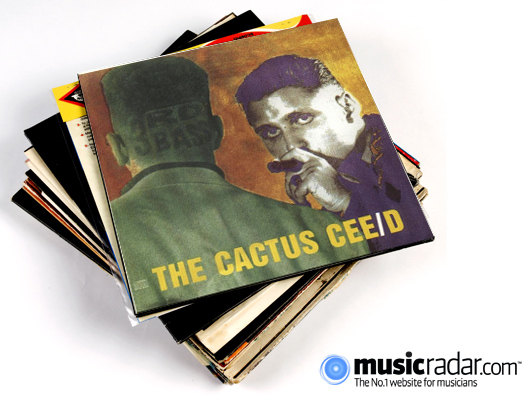
3rd Bass - Sons of 3rd Bass (1989)
Musicians who sample other people’s work are derided in some quarters, accusing of lifting existing loops, riffs and vocals because they’re not talented enough to come up with their own. However, while it’s undeniably the case that some samples are lazily employed simply as hooks to reel listeners in, when they’re crafted with care and skill, sample-based compositions can be every bit as artistic as those played on guitars and keyboards.
Late last year, MusicRadar asked you to name the song that makes the best use of a sample (or samples) ever. The nominations came flooding in, and we put these to the vote. More than 1,000 of you voiced your opinion, and we can now bring you the results.
One thing to note is that as well as including direct samples, we’ve also allowed in replays that don’t stray too far from their source material (ie, note for note recreations of riffs, basslines etc). With that made clear, let’s start the countdown with 3rd Bass’s Sons of 3rd Bass.
Hip-hop trio 3rd Bass were MC Serch, Pete Nice and DJ Richie Rich. Rising to prominence on Def Jam after Beastie Boys, the lyrics in Sons of 3rd Bass have been interpreted as a criticism of Mike D, MCA and Ad-Rock, who’d acrimoniously defected to Capital prior to the 1989 release of The Cactus Album, the long-player that the song comes from.
But what of the sample? The main riff and brass stabs are lifted from Spinning Wheel by Blood, Sweat & Tears, which appeared on the band’s eponymous 1968 album and was released as a single in 1969.
Listen: 3rd Bass - Sons of 3rd Bass
Listen: Blood, Sweat & Tears - Spinning Wheel
NEXT: Styles P - Good Times
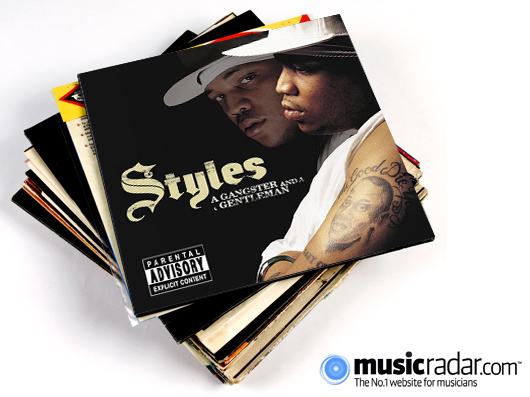
Styles P - Good Times (2002)
This ode to marijuana usage was the first single to be released from Styles P’s debut album A Gangster and a Gentleman, and was produced by highly-regarded hip-hop helmsman Swizz Beatz.
Released in 2002, the track features a speeded-up portion of Freda Payne’s I Get High (On You Memory), a 1977 single from her album Stares & Whispers.
Listen: Styles P - Good Times
Listen: Freda Payne - I Get High (On Your Memory)
NEXT: Young MC - Know How
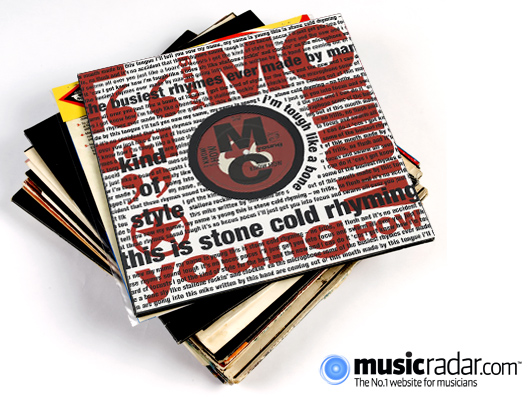
Young MC - Know How (1988)
Bust a Move may have been his biggest hit - and one that’s been reintroduced to a new audience thanks to Glee - but if a DJ wants to fill the floor, this is the Young MC record they put on. Both songs come from Stone Cold Rhymin’, the London-born but Queens New York-raised rapper’s debut album.
Know How, which was produced by The Dust Brothers, has a wah-wah guitar part that’s clearly taken from Isaac Hayes’ Shaft theme, but the drum break is also a sample - you have The Incredible Bongo Band’s oft-plundered version of Apache to thank for that.
Listen: Young MC - Know How
Listen: Isaac Hayes - Theme from Shaft
Listen: The Incredible Bongo Band - Apache
NEXT: Public Enemy - Show 'Em Whatcha Got
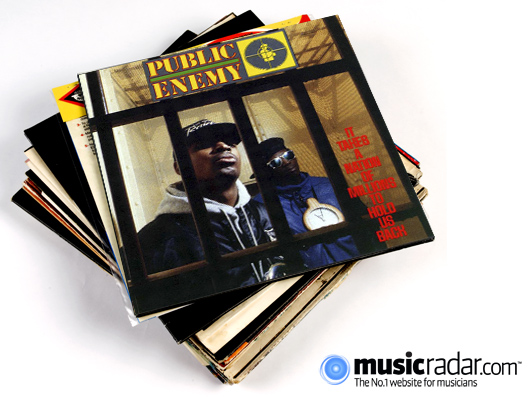
Public Enemy - Show 'Em Whatcha Got (1988)
It took a nation of millions to hold them back, but a couple of records helped further the Public Enemy cause on this 1988 release.
The all-important sax riff is taken from Lafayette Afro Rock Band’s Darkest Light, and was later appropriated by Jay-Z for his similarly-titled 2006 single Show Me What You Got.
Then there’s the spoken word sample: this comes from a live version of Bar-Keys’ Son of Shaft. The rest is all Chuck D and co.
Listen: Public Enemy - Show 'Em Whatcha Got
Listen: Lafayette Afro Rock Band - Darkest Light
Listen: Bar-Keys - Son Of Shaft (Live)
NEXT: Spiller - Groovejet (It This Ain’t Love)
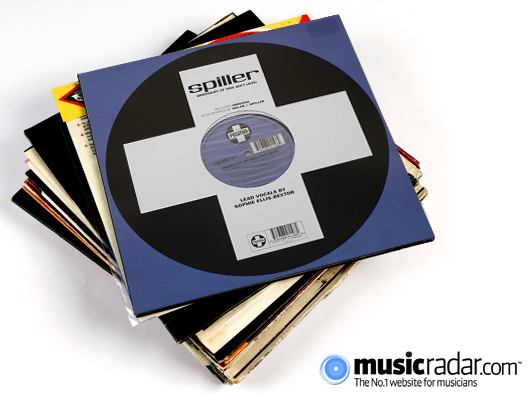
Spiller - Groovejet (It This Ain't Love) (2000)
This is famously (sort of) the song that prevented Victoria Beckham from reaching number 1 in the UK singles chart in 2000. It featured vocals from Sophie Ellis-Bextor, her first appearance on record since theaudience, the band in which she previously sang, split in 1998.
Really, though - and appropriately, given the its name - this song is all about the groove, which is powered by loops from Carol Williams’ 1977 Salsoul record Love Is You. In fact, Groovejet was originally an instrumental, its sound so infectious that it could have been a hit with or without Ellis Bextor’s contribution.
Listen: Spiller - Groovejet (It This Ain’t Love)
Listen: Carol Williams – Love Is You
NEXT: Boards Of Canada - Aquarius

Boards Of Canada - Aquarius (1998)
While some artists choose to sample famous songs so that their own material benefits from instantly recognisable hooks, Boards Of Canada tend to choose more obscure sounds and process them so that their origins aren’t immediately obvious.
Aquarius is a case in point. Taken from the EP of the same name and 1998 Warp album Music Has The Right To Children, you probably wouldn’t assume that its central sonic ingredients come from Ren Woods’ version of the song of the same name (her version featured on the soundtrack for 1979 film Hair) but when you hear the two tracks side by side, the similarities are obvious.
Listen: Boards Of Canada – Aquarius
Listen: Ren Woods - Aquarius
NEXT: Madonna - Hung Up

Madonna - Hung Up (2005)
ABBA’s Benny Andersson and Björn Ulvaeus have been reluctant to let other acts sample their music, so if, as is rumoured, Madonna completed the Stuart Price-produced Hung Up and sent it to them before asking permission to lift the hook from Gimme! Gimme! Gimme! (A Man After Midnight) she was taking quite a risk.
Fortunately for her, the Swedish duo eventually said yes, though reportedly only after they’d agreed a deal that saw them taking a sizeable portion of the sales and airplay royalties. And what a good deal that was: Hung Up was a global chart-topper.
Listen: Madonna - Hung Up
Listen: ABBA - Gimme! Gimme! Gimme! (A Man After Midnight)
NEXT: Paul Hardcastle - 19
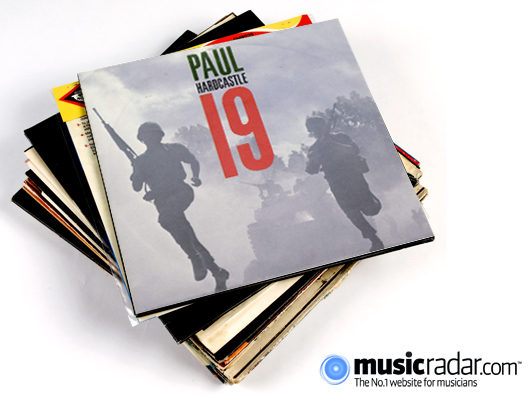
Paul Hardcastle - 19 (1985)
This song represents such a landmark moment in the history of sampling that when Propellerhead launched the first version of Reason in 1999, the company chose to call its sampler the NN-19 in tribute. It was also the inspiration for the name of Simon Fuller’s 19 Management company: Fuller was Hardcastle’s manager in 1985 and the success of 19 enabled him to continue his fledgling business, which would eventually bring us both The Spice Girls and American Idol. Now that’s what you call a legacy.
19, of course, is an anti-war anthem that repeatedly references the average age of combat soldiers in Vietnam. The sampled dialogue comes not from another song, but an ABC documentary called Vietnam Requiem, with the key phrases being spoken by narrator Peter Thomas.
Listen: Paul Hardcastle - 19
NEXT: Notorious B.I.G. feat Puff Daddy and Mase - Mo Money Mo Problems
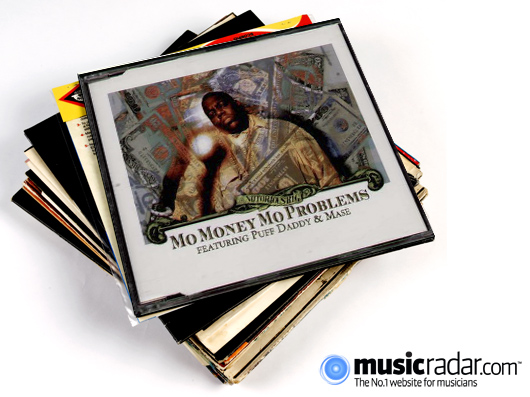
Notorious B.I.G. feat Puff Daddy and Mase - Mo Money Mo Problems (1997)
Chic’s Nile Rodgers is no stranger to having his work sampled, and it’s his choppy guitar line, taken from Diana Ross’s I’m Coming Out (which he and Bernard Edwards wrote and produced) that dominates proceedings here.
Mo Money Mo Problems was a posthumous hit for Biggie, replacing Puff Daddy, 112 and Faith Evans’ I’ll Be Missing You at the top of the Billboard Hot 100 in 1997. This song, of course, was written and recorded in tribute to him and also made heavy use of a sample (from The Police’s Every Breath You Take).
Listen: Notorious B.I.G. feat Puff Daddy and Mase - Mo Money Mo Problems
Listen: Diana Ross - I’m Coming Out
NEXT: Afrika Bambaataa and Soulsonic Force - Planet Rock
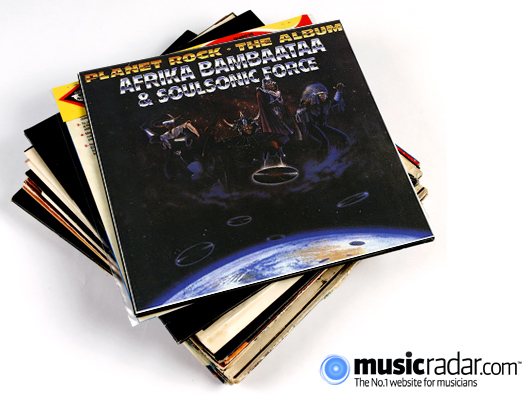
Afrika Bambaataa and Soulsonic Force - Planet Rock (1982)
This hugely influential Arthur Baker-produced hip-hop/electro record wasn’t just inspired by Kraftwerk, it sampled them. The beat came courtesy of the German outfit’s Numbers, while the synth line was a replay of the one from Trans Europe Express.
Tommy Boy Records (the label that Planet Rock was released on) eventually reached an out of court settlement with Kraftwerk, with Ralf Hütter and Florian Schneider being credited as co-writers. It’s perhaps ironic, then, that Planet Rock itself has also been sampled numerous times.
Listen: Afrika Bambaataa and Soulsonic Force - Planet Rock
Listen: Kraftwerk - Numbers
Listen: Kraftwerk - Trans Europe Express
NEXT: M|A|R|R|S - Pump Up the Volume
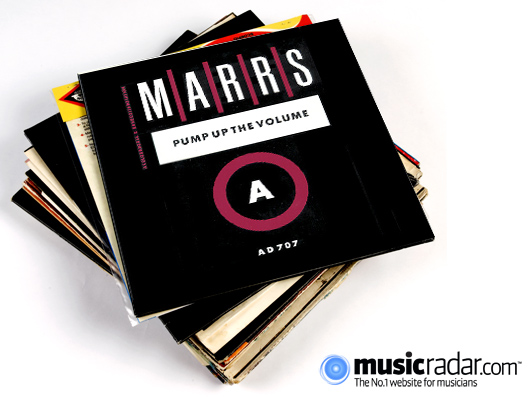
M|A|R|R|S - Pump Up the Volume (1987)
This massively influential 1987 UK house track went a long way towards popularising the use of sampling in dance music and features snatches of audio from myriad artists including James Brown, Bar-Keys, Public Enemy, Run-D.M.C, and Fred Wesley and The J.B’s.
The original version also contained a vocal snippet from Stock, Aitken Waterman’s Roadblock, but an objection from them led to it being removed in overseas releases.
M|A|R|R|S was a collaboration between bands A.R. Kane and Colourbox, but despite Pump Up the Volume being a number one hit, it was their only release together.
Listen: M|A|R|R|S - Pump Up the Volume
NEXT: Beastie Boys - Rhymin & Stealin

Beastie Boys - Rhymin & Stealin (1986)
If you’re going to sample a drum beat, the one that John Bonham laid down for Led Zeppelin’s When The Levee Breaks is a pretty good one to go for, and it’s this that that drives Rhymin & Stealin, taken from 1986’s seminal Licensed To Ill.
Further homage to the rock world is played with the guitar riff, a replay of the one from Black Sabbath’s Sweet Leaf, and there’s even a nod to The Beasties’ punk roots with a one-play vocal sample from The Clash’s I Fought The Law. In fact, if you ever wanted to know why The Beastie Boys became the hip-hop act that turned rock fans heads, this song tells you.
Listen: Beastie Boys - Rhymin & Stealin
Listen: Led Zeppelin - When The Levee Breaks
Listen: Black Sabbath - Sweet Leaf
NEXT: Beastie Boys - Sure Shot
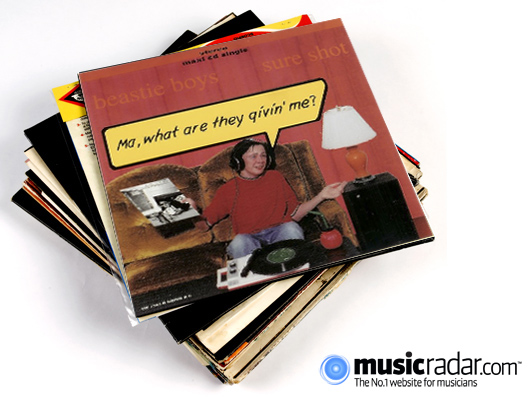
Beastie Boys - Sure Shot (1994)
Another entry for The Beasties, though this time it’s not heavy beats and guitars that they’re sampling, but a flute line played by New York jazzer Jeremy Steig. This is one of those cases were the sample is the key component of the song: it plays throughout and is the main hook.
Loitering in the background is a second sample - the drum loop from Run-D.M.C.'s King Of Rock. It might not be as obvious as the flute riff, but it’s definitely there, and you’d miss it if it wasn’t.
Listen: Beastie Boys - Sure Shot
Listen: Jeremy Steig - Howlin’ for Judy
Listen: Run-D.M.C - King Of Rock
NEXT: The Sugarhill Gang - Rapper's Delight

The Sugarhill Gang - Rapper's Delight (1979)
Possibly the most famous ‘sample’ of all time, though the bassline in Rapper’s Delight is actually a replayed version of the one from Chic’s Good Times (listen to them side by side and you’ll notice subtle timing differences). There’s no debate about where the bassline came from, though: Chic’s Bernard Edwards and Nile Rodgers are credited as co-writers.
The story goes that the idea for the song was born when rapper Fab Five Freddy and members of the Sugarhill Gang got on stage with Chic when they were playing Good Times at a New York nightclub and started freestyling over the top of it. The rest is musical history: Rapper’s Delight is widely recognised as hip-hop’s breakthrough track.
Listen: The Sugarhill Gang - Rapper's Delight
Listen: Chic - Good Times
NEXT: DJ Shadow - Midnight In A Perfect World
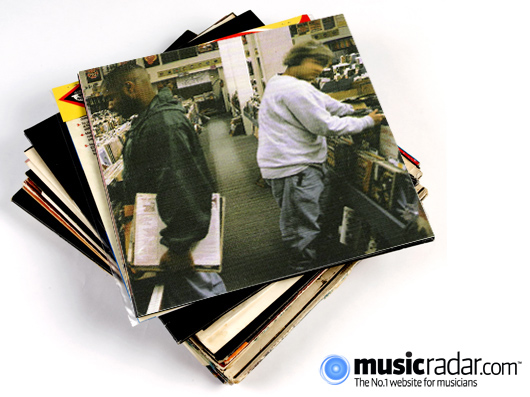
DJ Shadow - Midnight In A Perfect World (1996)
Picking out a ‘best sample’ from Entroducing, the debut album from DJ Shadow, is difficult, for the whole thing is basically samples. MusicRadar users expressed a particular fondness for Midnight In A Perfect World, though, and we’ve picked out a couple of key components.
The first is the phased electric piano progression from Finnish musician Pekka Pohjola’s The Madness Subsides, and then there’s the drum break from Marlena Shaw’s California Soul. These are just starting points, though: with his trusty Akai MPC-60, DJ Shadow demonstrated an incredible ability to take a disparate collection of samples and make it sound like they always belonged together.
Listen: DJ Shadow - Midnight In A Perfect World
Listen: Pekka Pohjola - The Madness Subsides
Listen: Marlena Shaw - California Soul
NEXT: Your favourite use of a sample ever
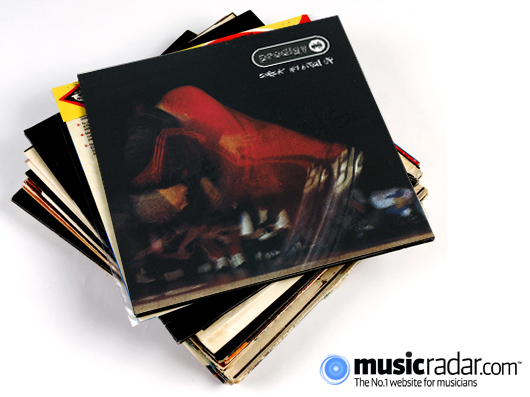
The Prodigy - Smack My Bitch Up (1997)
Liam Howlett and co’s 1997 smash was a clear winner among MusicRadar users, though it’s hard to know which sample you like the best. Is it the bassline, from Randy Weston’s In Memory Of; the vocal, from Ultramagnetic MC’s Give The Drummer Some; or perhaps the drum loop, from the same outfit’s Critical Beatdown?
In truth, it’s probably all of these and more - more than 13 years after its release, it’s clear that Smack My Bitch Up has weathered the storm of controversy surrounding its release to become hugely admired for the technical prowess that went into its production.
Speaking of which, we should draw your attention once again to Jim Pavloff’s superb ten-minute recreation of Smack My Bitch Up in Ableton Live. Amazingly, he manages to make it look easy, but Howlett didn’t have the benefit of such software when he was producing the song, and he had to come up with the inspiration, too.
Listen: The Prodigy - Smack My Bitch Up
Watch: The Prodigy's Smack My Bitch Up recreated in 10 minutes
Liked this? Now read: 10 songs that have been sampled to death
Connect with MusicRadar: via Twitter, Facebook and YouTube
Get MusicRadar straight to your inbox: Sign up for the free weekly newsletter

I’m the Deputy Editor of MusicRadar, having worked on the site since its launch in 2007. I previously spent eight years working on our sister magazine, Computer Music. I’ve been playing the piano, gigging in bands and failing to finish tracks at home for more than 30 years, 24 of which I’ve also spent writing about music and the ever-changing technology used to make it.









